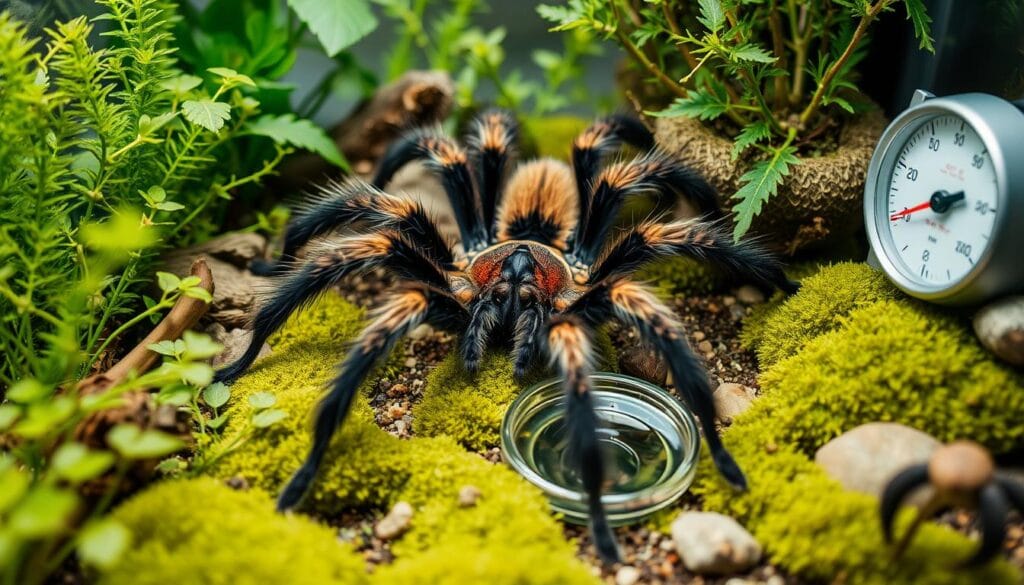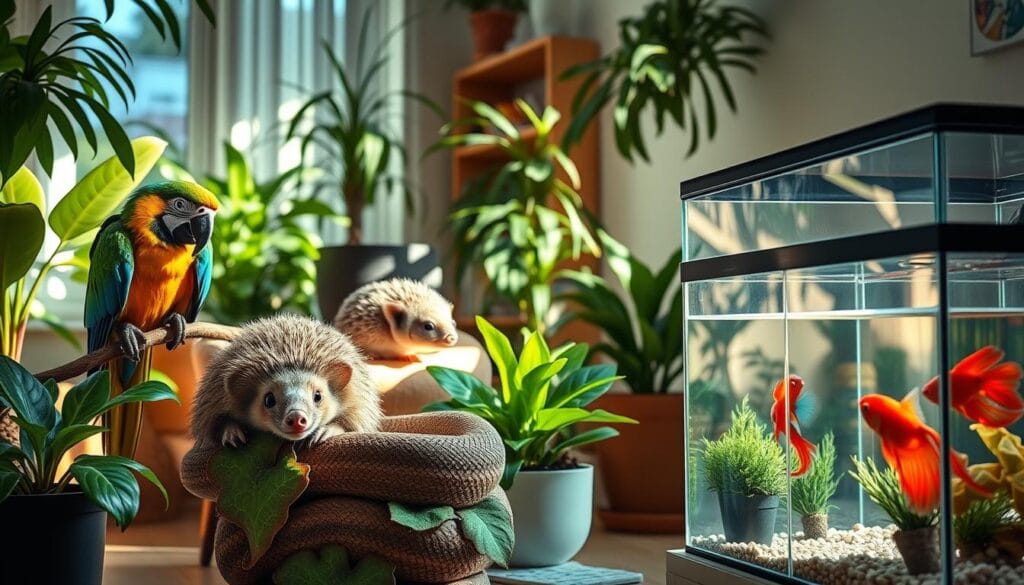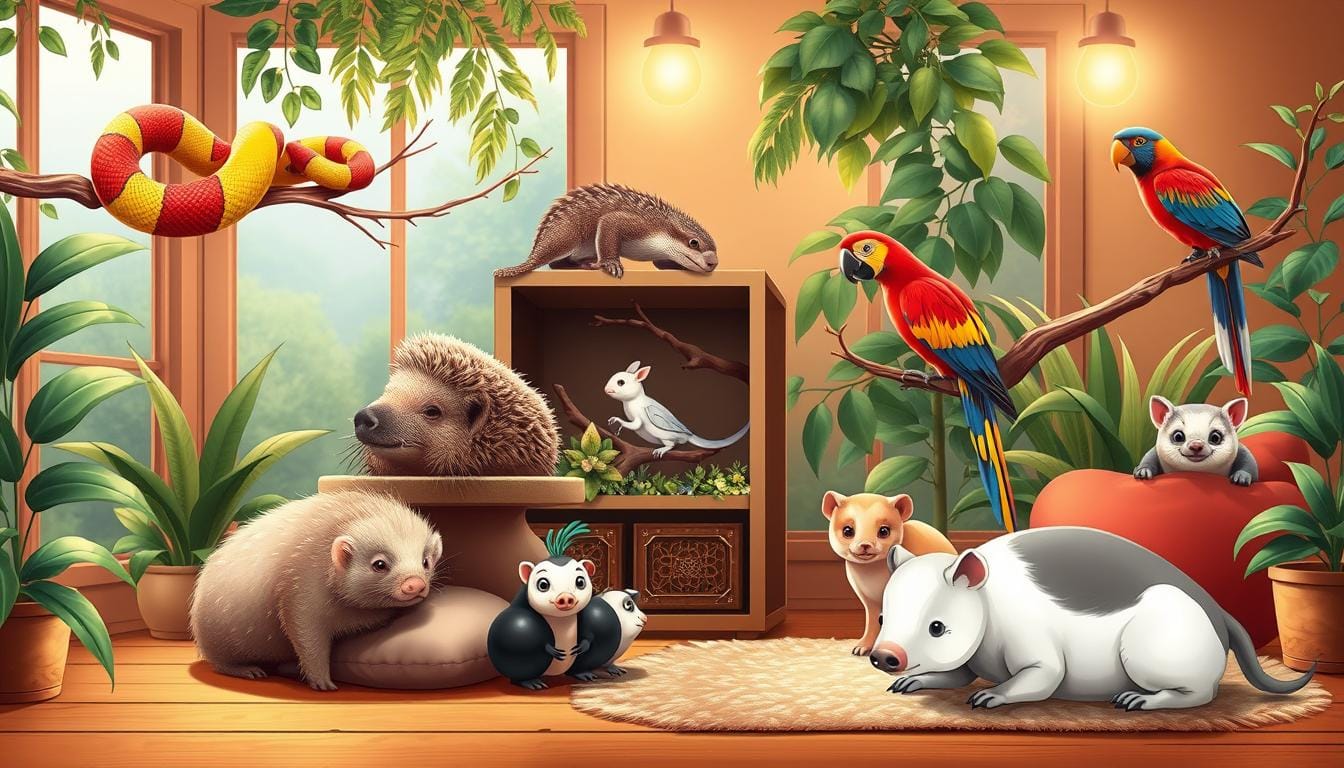Exploring the world of exotic pets, I see the special bond between humans and animals. Many want to own Legal Exotic Pets but need to know their care needs. Birds and reptiles can be great friends, but knowing their needs and laws is key. This article will introduce 7 Legal Exotic Pets that are easy to care for, perfect for new owners.
I want to give a detailed guide on Legal Exotic Pets. We’ll look at their traits, needs, and care laws. Whether you’re thinking of a snake, bird, or small mammal, this article will help you choose the right pet.
Table of Contents
What Are Legal Exotic Pets?
Exploring the world of exotic pets often raises questions about what they are and why they’re interesting. Legal Exotic Pets include animals like birds, reptiles, and small mammals. They can bring joy and companionship to a family.
It’s key to know the laws about owning these pets. Some Small Animals, like hedgehogs or sugar gliders, might be okay in some places. But others, like certain birds or reptiles, might need special permits.
There are many good reasons to have exotic pets. They can connect us to nature and are often easy to care for. Here are a few reasons why:
- Unique companionship: Exotic pets can form strong bonds with their owners, providing a sense of connection and companionship.
- Low-maintenance: Some exotic pets, like tarantulas or fish, are relatively easy to care for, making them a great option for busy owners.
- Educational opportunities: Owning an exotic pet can be a great learning experience, teaching owners about the animal’s habitat, diet, and behavior.
Definition of Exotic Pets
Exotic pets are animals that are not typically considered domesticated, such as birds, reptiles, and small mammals. They come from all over the world and vary greatly in their needs and characteristics.
Benefits of Owning Exotic Pets
Owning an exotic pet can be very rewarding. It offers companionship, entertainment, and a connection to nature. With proper care, these pets can become cherished family members.
Choosing the Right Exotic Pet for You
Thinking about getting a Domestic Animal? It’s key to match your lifestyle and home with the right pet. Each exotic pet needs its own space and environment. Some might even need special permits.
For example, a Fennec Fox needs lots of room and exercise. On the other hand, a Pet Fox might do well in a smaller space, like an apartment.
Before picking an exotic pet, think about if you can give it the care it needs. Here are some things to keep in mind:
- Space: Do you have enough room in your home for a large cage or enclosure?
- Environment: Can you provide the right temperature, humidity, and lighting conditions for your pet?
- Legal requirements: Are you aware of the permits and licenses required to own an exotic pet in your state?
By carefully considering these factors, you can make sure you’re making a good choice. Whether it’s a Fennec Fox, a Pet Fox, or another exotic pet, always put their needs first.
1. Ball Python: A Gentle Snake
Exploring exotic pets, I’m drawn to the Ball Python. It’s a mix of gentleness and charm, like the Cute Fox. Found in Africa, this snake is harmless and perfect for those who love Amazing Animals. Its small size and beautiful patterns make it a favorite among pet lovers. Plus, it’s easy to care for.
For a Ball Python’s home, you need a space that feels like its natural habitat. This means a roomy, well-ventilated area with heat and hiding spots. As Small Animals, Ball Pythons are easy-going pets. But, they need the right food and care to thrive.
To keep your Ball Python healthy and happy, remember these tips:
- Give it a big enough home to grow in
- Keep the temperature between 75-85°F, with a warm spot for basking
- Feed it a mix of pre-killed mice or rats regularly
- Make sure it always has fresh water
By following these easy steps, you can make your Ball Python’s life great. And you’ll get to enjoy having this incredible Amazing Animal as a pet.
2. Bearded Dragon: The Friendly Lizard
The Bearded Dragon is a popular exotic pet known for being friendly and calm. It’s a great choice for those looking for a pet. Before buying, it’s important to learn about its needs, like its habitat and how it likes to interact.
This lizard is small to medium in size and comes from Australia. It’s known for being curious and friendly. To make a good home for your Bearded Dragon, you need to think about temperature, lighting, and humidity. Here are some important things to remember:
- Temperature: 75-90°F (24-32°C) with a basking spot of 95-100°F (35-38°C)
- Lighting: UVB lighting to promote calcium metabolism and prevent metabolic bone disease
- Humidity: 30-50% with a slight increase during shedding
Bearded Dragons also need to interact with people to be happy. As a Legal Exotic Pet, it’s important to know how to handle and socialize them. With the right care, your Bearded Dragon can be a happy and healthy pet.
Owning a Bearded Dragon or any exotic pet is a big commitment. It’s important to research and understand your pet’s needs before getting one. With the right care, your Bearded Dragon can become a loyal and loving friend.
| Habitat Factor | Requirement |
|---|---|
| Temperature | 75-90°F (24-32°C) |
| Lighting | UVB lighting |
| Humidity | 30-50% |
3. African Grey Parrot: Intelligent Companions
The African Grey Parrot is one of the most amazing animals in exotic pets. They are known for their intelligence and ability to mimic human speech. Their sleek grey feathers and expressive eyes make them very charming.
Even though they are not small, African Greys can form strong bonds with their owners. This makes them a favorite among many.
African Greys are unmatched in communication skills. They can understand context and mimic human speech very well. This makes them great for those who want a pet that can talk back.
But, it’s important to remember that African Greys need regular mental stimulation. This prevents boredom and stress. Toys, puzzles, and social interaction can keep them happy and healthy.
Some key things to consider when caring for an African Grey Parrot include:
- Providing a balanced diet that includes fruits, vegetables, and pellets
- Creating a stimulating environment with plenty of toys and activities
- Spending quality time with your parrot to strengthen your bond and provide social interaction
By understanding the communication and mental stimulation needs of the African Grey Parrot, you can provide a happy and healthy home. Their intelligence, charm, and ability to form strong bonds make them a popular choice for exotic pet owners.
| Characteristics | Description |
|---|---|
| Intelligence | Highly intelligent and able to understand context |
| Communication Skills | Able to mimic human speech with uncanny accuracy |
| Mental Stimulation Needs | Requires regular mental stimulation to prevent boredom and stress |
4. Sugar Glider: Small but Social Critters
Thinking about getting a Legal Exotic Pet? Sugar Gliders have special needs. They need regular social time to be happy. They’re not as demanding as a Fennec Fox, but they do need attention to become tame and loving.
Sugar Gliders are small, nocturnal marsupials from Australia. They have big eyes and can glide. To socialize them, handle them gently and often. Spend time with them daily, give treats, and make their environment safe and fun.
Socialization Tips
- Handle them gently and frequently to build trust
- Provide a variety of toys and activities to stimulate their natural behavior
- Offer treats and rewards to encourage positive interaction
Diet Basics
A balanced diet is key for a Sugar Glider’s health. Their diet should have protein, fruits, and veggies. But, they should have little sugar and fat. Always give them fresh water and avoid toxic foods.
Follow these tips for socialization and diet. You’ll create a happy, healthy home for your Sugar Glider. They’ll be a great and unique pet for your family of Legal Exotic Pets.
5. Hedgehog: Quirky and Adorable
The Hedgehog is a unique and quirky pet that brings joy to many. It’s small and cute, making it a favorite among exotic pet lovers.
Understanding the basic care of a Hedgehog is key. You need to give it a good diet, a clean home, and check its health often. Hedgehogs are easy to care for but need special attention.
Basic Care Essentials
For a Hedgehog’s diet, use high-quality commercial food and add fruits and veggies. They need a big, well-ventilated cage to move around. This is important because Hedgehogs are active and can get fat if they don’t exercise enough.
Handling and Bonding
It’s important to handle and bond with your Hedgehog. Start with short, gentle sessions and increase time as they get used to you. Hedgehogs are active at night, like some Amazing Animals.
Owning a Hedgehog is rewarding, letting you connect with an unusual pet. By meeting their care and handling needs, you can build a strong bond. Enjoy the companionship of these quirky and cute creatures.
| Pet | Diet | Habitat |
|---|---|---|
| Hedgehog | Commercial food, fruits, vegetables | Large, well-ventilated cage |
| Cute Fox | Varies by species | Depends on the species and size |
| Amazing Animals (general) | Diverse, depending on the animal | Specific to each type of animal |
6. Tarantula: Low-Maintenance Arachnids
Tarantulas are a type of Domesticated Animals and are popular Pets For Sale. They are considered Legal Exotic Pets. It’s important to know their needs well.
For a tarantula’s home, you need a secure, well-ventilated space. The temperature should be between 75-85°F. They eat crickets, mealworms, and other insects. Here are some key things to remember for tarantula care:
- Habitat and enclosure needs: a secure, well-ventilated enclosure with a temperature range of 75-85°F
- Feeding schedule: a diet of crickets, mealworms, and other insects
- Handling and interaction: gentle handling and regular interaction to promote a healthy bond
Knowing what your tarantula needs helps keep them happy and healthy. Tarantulas can be great pets for anyone, whether you’re new or experienced with exotic pets.

| Tarantula Care | Requirements |
|---|---|
| Habitat | Secure, well-ventilated enclosure |
| Temperature | 75-85°F |
| Diet | Crickets, mealworms, and other insects |
7. Koi Fish: Colorful Pond Dwellers
Koi Fish are among the most amazing animals for pets. They are loved for their bright colors and long lives, up to 25-30 years. They may not be as cuddly as a Cute Fox, but they are a joy to watch and care for.
Setting up a pond for Koi Fish requires careful planning. You need a large, well-filtered pond that’s at least 3-4 feet deep. For more tips, check out this website. It has advice on choosing fish, setting up your pond, and keeping your fish healthy.
Pond Setup Essentials
When setting up your pond, consider these key points:
- Choose a good filter system to keep the water clean
- Add plants and features to create a natural environment
- Make sure the pond is big enough for your fish to swim
Water Quality Management
Keeping the water quality high is vital for your Koi Fish’s health. Regular water changes, proper filtration, and a balanced diet are essential. By following these tips, you can create a beautiful pond that will bring you joy for years.
With proper care, your Koi Fish can live a long, happy life. They add beauty and wonder to your outdoor space. Whether you’re new to aquatic pets or experienced, Koi Fish are a unique and rewarding choice.
| Pond Size | Filter System | Water Depth |
|---|---|---|
| At least 4×6 feet | Suitable for pond size | At least 3-4 feet |
Legal Considerations for Exotic Pet Ownership
Thinking about getting Legal Exotic Pets? It’s key to know the laws and rules about them. These laws change by state and country. You must check them before getting an exotic pet.
Some states have special rules for owning Fennec Fox as pets. This is just one example.
There are also federal rules for exotic pets. These might include needing permits, licenses, and health checks. Remember, the well-being of Domestic Animals is important when you get an exotic pet.
Permits and Regulations
Having an exotic pet is more than just loving animals. You need to know the laws and rules well. This means getting the right permits and licenses. You also have to follow rules for their care and home.
State-Specific Laws
Some states don’t let you have certain exotic pets. Others might need special permits or licenses. For example, some states need a permit for a Fennec Fox. Others might not let you have them at all. Always check your state’s laws before getting an exotic pet.
Preparing Your Home for an Exotic Pet
Thinking about getting a Cute Fox or other Amazing Animals means making my home safe for them. It’s not just about removing dangers. It’s about making a space where they can be happy and healthy.
I’ll first check my home for hazards like loose wires and toxic plants. I’ll also make sure areas like the kitchen are off-limits. This way, I can keep my pet safe from accidents.
Creating a Safe Environment
Creating a safe space needs careful planning. I’ll think about what my pet needs, like food, exercise, and friends. For example, a Cute Fox needs a safe place to play and rest.
Necessary Supplies and Accessories
I’ll need to get food, water, a home, and vet care for my pet. I’ll also get toys, bedding, and grooming tools. These things will help my pet feel at home and stay healthy.
Here’s a list of some necessary supplies and accessories:
- Food and water bowls
- A comfortable shelter or enclosure
- Toys and enrichment activities
- Grooming tools, such as brushes and nail clippers
- Veterinary care and health checks
Common Myths About Exotic Pets
Thinking about getting Domesticated Animals? It’s key to know the truth. Many believe exotic pets are wild, dangerous, or easy to care for. But, these ideas are not always true. Many Legal Exotic Pets can be great friends, bringing joy, learning, and love.
Some common myths about exotic pets include:
- They are too difficult to care for
- They are a danger to humans
- They are low-maintenance pets
These wrong ideas can stop people from choosing exotic pets. But, with the right care and love, they can live well with us.

For those looking at Pets For Sale, it’s important to research well. Knowing what your pet needs helps you give them a happy life.
| Pet Type | Care Requirements | Socialization Needs |
|---|---|---|
| Reptiles | Proper temperature and humidity | Handling and interaction |
| Amphibians | Aquatic environment and diet | Observation and gentle handling |
| Birds | Large cage and social interaction | Training and mental stimulation |
By knowing what exotic pets need and clearing up myths, we can give them the care they deserve. This makes for a happy and fulfilling life for both pet and owner.
Resources for Exotic Pet Owners
As an exotic pet owner, I know how vital it is to have good resources and support. Finding reliable vets and connecting with others who care for similar pets is key. It greatly impacts the health and happiness of my amazing animals.
Finding Trusted Veterinarians
Finding a vet who knows about my pets’ special needs is essential. I’ve found great vets by asking local pet stores, reptile clubs, or online forums. A good vet who understands my pets’ needs is vital for their health and happiness.
Online Communities and Forums
Online communities and forums are also very helpful. They let me share experiences, get advice, and learn from others. Whether it’s about my sugar glider’s habitat or tarantula care, these spaces are invaluable to me.

